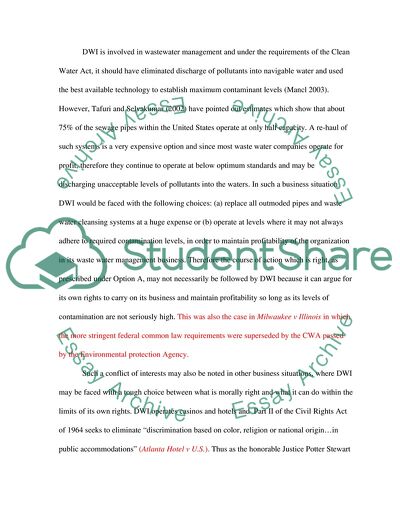
- Home
- Free Samples
- Premium Essays
- Editing Services
- Extra Tools
- Essay Writing Help
- About Us
- Studentshare
- Subjects
- Miscellaneous
- The Legal and Ethical Environment of Business
The Legal and Ethical Environment of Business - Essay Example

- Subject: Miscellaneous
- Type: Essay
- Level: Ph.D.
- Pages: 4 (1000 words)
- Downloads: 0
- Author: cassandre23
Extract of sample "The Legal and Ethical Environment of Business"
from morality, because in achieving its objective of ensuring order, the law must also demonstrate respect for individual autonomy and rights, based upon moral principles of what is good (Fuller, 1964:39). However, according to Hart, there is a distinction between the philosophy of law and legal theory, thus morals must be separated from the law (Hart, 1958:596-7). He classifies two kinds of rules for the existence of a legal system as (a) “rules of behavior” which must be obeyed and (b) “rules of recognition” where legal validity and the rules of adjudication will be conditioned by the “common public standards of official behavior.
” (Hart, 1958:113). On this basis, it may therefore be noted that while there may be certain courses of action that would be right from a moral perspective, these may not necessarily be followed within a legal system where a certain degree of individual freedoms may be mandated under the standards deemed right by society. Thus DWI may be morally obliged to do certain things which are right but may be well within its rights to perform differently in order to satisfy its own interests. DWI is involved in wastewater management and under the requirements of the Clean Water Act, it should have eliminated discharge of pollutants into navigable water and used the best available technology to establish maximum contaminant levels (Mancl 2003).
However, Tafuri and Selvakumar (2002) have pointed out estimates which show that about 75% of the sewage pipes within the United States operate at only half capacity. A re-haul of such systems is a very expensive option and since most waste water companies operate for profit, therefore they continue to operate at below optimum standards and may be discharging unacceptable levels of pollutants into the waters. In such a business situation DWI would be faced with the following choices: (a) replace all outmoded pipes and waste water cleansing systems at a huge expense or (b) operate at levels
...Download file to see next pages Read MoreCHECK THESE SAMPLES OF The Legal and Ethical Environment of Business
DWI (The Legal and Ethical Environment of Business)
The Legal and Ethical Environment of Business Master Essay
Legal and Ethical Environment of Business
Legal and Ethical Environment of Business
Legal and Ethical Issues in Law
Ethics and Legal Environment, Business Association and Torts, Critical Thinking
Legal Environment of Business and Business Ethics
Legal Environment of Business and Business Ethics

- TERMS & CONDITIONS
- PRIVACY POLICY
- COOKIES POLICY